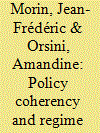| Srl | Item |
| 1 |
ID:
117947


|
|
|
|
|
| Publication |
2013.
|
| Summary/Abstract |
This article takes stock of the current debate on regime complexes. The specific relevance of such complexes for global governance is best grasped if these complexes are understood as systems that relate and organize their elemental institutions. They emerge from activities of relevant international actors, in particular the member states of their elemental institutions, as well as from interactions among these institutions. Regime complexes establish interinstitutional competition, which may lead to open conflict and turf battles, but may also produce a well-established division of labor among the elemental institutions. As they provide forum-shopping opportunities for actors, regime complexes put overlapping governance institutions under continuing competitive pressure and they do not necessarily predominantly benefit the most powerful states. In order to increase the coherence and effectiveness of global governance efforts, the management of regime complexes will become an increasingly important task of global governance.
|
|
|
|
|
|
|
|
|
|
|
|
|
|
|
|
| 2 |
ID:
131708


|
|
|
|
|
| Publication |
2014.
|
| Summary/Abstract |
This study argues that 'regime complexes' and 'policy coherence' are two faces of the same integrative process. The development of regime complexes co-evolves with the pressures on decision makers to coordinate their policies in various issue-areas. Conceptually, we introduce a typology of policy coherency (erratic, strategic, functionalistic, and systemic) according to its procedural and substantive components. Empirically, by triangulating quantitative and qualitative data, we use this typology for the case of the genetic resources' regime complex to illustrate the links between regime complexes and policy coherency. Our results suggest that a coherent policymaking process favours integrated regime complexes, while greater exposure to a regime complex increases the pressure to have a coherent policymaking. This study fills a gap in the literature on regime complexes by providing a micro-macro model linking structure to agency.
|
|
|
|
|
|
|
|
|
|
|
|
|
|
|
|
| 3 |
ID:
117942


|
|
|
|
|
| Publication |
2013.
|
| Summary/Abstract |
Recurrentfood price crises, coupled with the steady deterioration of world
food security overthe pasttwo decades, have prompted effortsto reform
the global governance of food security. This article argues that diverging
rules and norms across the elemental regimes of agriculture and food, international trade, and human rights over the appropriate role of states
and markets in addressing food insecurity are a major source of transnational political conflict. It analyzes(1)the role of normsin the construction
of the international food security regime; (2) the transition from an international food security regime to a regime complex for food security; and
(3)rule and norm conflicts within thisregime complex. It concludes with a
discussion ofthe impacts of diverging norms on the politics ofregime complexity and its policy implications for current efforts to reform the global
governance of food security.
|
|
|
|
|
|
|
|
|
|
|
|
|
|
|
|
| 4 |
ID:
129041


|
|
|
|
|
| Publication |
2014.
|
| Summary/Abstract |
Regime complexes or overlapping regimes relating to a common subject matter create policy coherence challenges at the national level. Recent research has observed a positive correlation between regime complexes and policy coherence: improved regime integration enables greater policy coherence and vice versa. Policy coherence has nonetheless been approached as a problem of foreign policy and not yet as a problem of public policy. This article examines the coevolution of regime complexes and (public) policy coherence in the context of international biodiversity governance, with a focus on the cluster of biodiversity-related conventions and their implementation in countries of Latin America and the Caribbean. It shows that global synergies in the biodiversity cluster have advanced more rapidly than national coordination of implementation activities. Feedback loops between governance levels have not been strong enough to bridge that gap. The article concludes that more symmetrical evolutions require deliberate cross-level management.
|
|
|
|
|
|
|
|
|
|
|
|
|
|
|
|